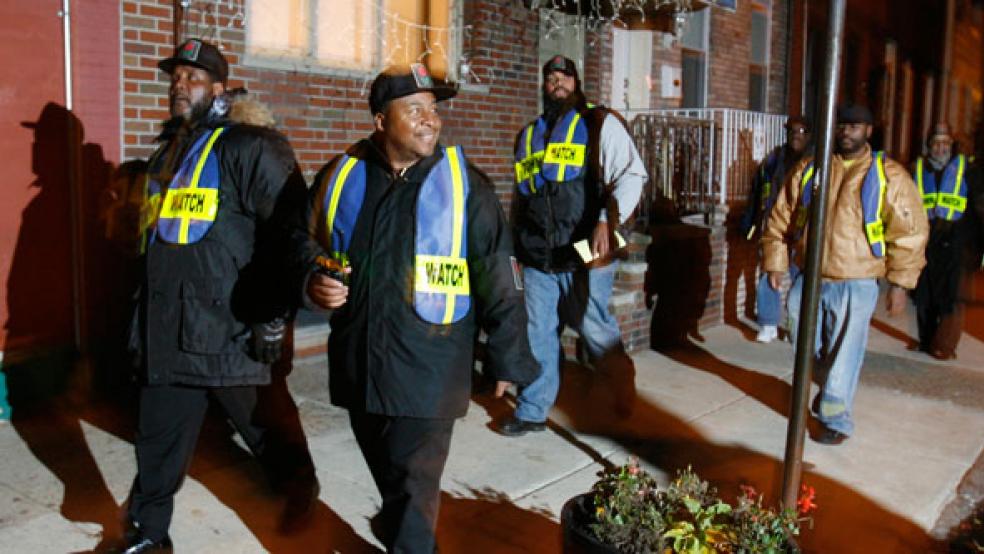Dabney Lawless, 38, took it personally when criminals targeted her neighborhood in east Oakland with a rash of burglaries. It was December 2010, and due to the city’s budget shortfall, Oakland — a city with the California’s highest violent-crime rate — had just laid off more than 10 percent of its cops.
So Lawless started going door to door, recruiting neighbors to revive a dormant neighborhood watch group. The group, of which she’s a block captain, decided to do more than patrol the streets. Last year more than a hundred of them chipped in about $250 each to hire a private security company to cruise through the neighborhood in a patrol car. Lawless says that investment, plus neighbors using the watch group to keep each other informed about suspicious behavior, has already made the neighborhood feel safer, and though she doesn’t have the data to support it, she’s certain the number of burglaries has dropped dramatically.
RELATED: 9 Worst Recession Ghost Towns in America
With the economic slowdown pushing municipal budgets to the brink, police layoffs and rising crime levels have been a common story in the hardest-hit American cities. Survey results from more than 700 police departments, released in April, showed that 21 percent had layoffs in the past two years. Another 56 percent shrank as a result of employee attrition. “In places like Camden New Jersey, and Oakland California, the budget cuts are having a direct impact on violent crime, which is significantly higher,” says Chuck Wexler, director of the Police Executive Research Forum, the group that did the study.
That has citizens in the toughest areas taking charge of their own protection — many are joining neighborhood watch groups, hiring armed guards, and using new online tools to communicate about shady activity on their streets.
In Newark New Jersey, for example, arrest numbers dropped and the crime rate spiked after 167 officers were laid off in December 2010. Between January and June of 2011, police made almost 4,000 fewer arrests than they did during the same period in 2010, according to the New Jersey Star-Ledger. And the city had 91 homicides last year, the most since 2007, while the number of non-fatal shootings rose 35 percent between 2009 and 2011.
That’s led a group of residents in the city’s Ironbound neighborhood to work with the police to recruit volunteers for a block watch program there. A local company has kicked in a thousand dollars to install dozens of neighborhood watch signs, and a business improvement group has offered to clean up litter and graffiti.
In the past, there’s been evidence to show these types of efforts can cut into crime. A 2008 U.S. Department of Justice meta-analysis of 18 studies done between 1977 and 1994 concluded that block watch programs were associated with a 16-percent decrease in crime compared with control areas. In the late 1980s in Philadelphia, for example, John Goldberg, a former community organizer, put together neighborhood watches in Philadelphia’s Kensington neighborhood. The group’s tips to police about drug dealers, he says, led to more than 650 arrests in just 18 months.
RELATED: Oil Price Woes: Fewer School Buses, Police Cars
Matt Peskin, who directs the National Association of Town Watch has noticed an increase in calls about joining watch programs since the recession started, though he has no hard numbers. He says block watch groups tend to grow and get active in response to specific neighborhood threats like a spate of muggings. Once they’ve cut into the crime problem though, interest tends to flag again as people start feeling safer he adds.
Stockton, Calif., is one place where neighborhood watch groups are on the rise. The city, which just declared bankruptcy, has laid off 25 percent of its police officers since 2009. Last year there were a record 58 homicides, an all-time high, and there have been 35 halfway through 2012. The city already has about 100 neighborhood watch groups, and more are being created all the time, according to Stockton police.
Peskin says an active block watch doesn’t mean crossing the line from vigilance to vigilantism. Volunteers aren’t allowed to carry guns while on patrol nor intervene in crimes in progress, except to call police — the program’s official manual notes that watch volunteers “shall not carry weapons.” About the recent George Zimmerman-Trayvon Martin case, Peskin says “it just breaks all the rules.”
Even so, while there are 25,000 registered neighborhood watch organizations, there are also many unregistered groups, according to the National Sheriff’s Association, which sponsors the program. It’s unclear whether groups that aren’t registered follow the national guidelines, and there have been some reported incidents of armed citizens conducting watches. In July 2009, an armed watch volunteer in a suburb of Salt Lake City, Utah, was shot by another man who felt that the volunteer was harassing his teenage daughter.
In hard-hit cities like Detroit, citizens are turning to bodyguards and private security companies. There the number of cops has dropped from about 5,000 a decade ago to fewer than 3,000 today, while the per-capita homicide rate has remained one of the highest in the country. Of armed robberies in the city, Dale Brown, owner of the Detroit-based private security firm Threat Management Center says, “Three armed men are the standard now since so many people have concealed weapons permits.” Indeed, the number of justifiable homicides in Detroit, in which citizens kill in self-defense, rose from 19 in 2010 to 33 last year.
It’s hardly surprising then, that Brown’s company has exploded — his customer base has gone from a hundred to more than a thousand in just two years. Detroit police response times for priority 911 calls now average 24 minutes in the city. By contrast, Brown says that when his customers call, he has one of his security specialists at the target property in under 5 minutes.
Overall, the number of private security guards long ago outstripped that of public-sector cops. In the 1970s, there were 40 percent more police than private security guards. By 2009, those positions had flipped, with about 60 percent more private guards than public officers, according to Simon Hakim, who directs Temple University’s Center for Competitive Government. In Stockton, Calif., for example, the largest private security company in the city, Delta Hawkeye Security Service, has seen an 80 percent jump in business since 2009. That’s good news for cops who have lost their jobs: many laid-off, retired, and off-duty cops have found work at private security firms.
Residents in other cities are turning to new Internet applications to enhance information-sharing between themselves and with police. One new company, Nextdoor — offers an online platform for neighborhoods to set up free private social networks they can use to share crime prevention tips and other information. Residents in one Oakland neighborhood recently used the platform’s “Urgent Alerts” feature, which allows members to share hot tips by text message.
Residents are even supplementing the work of short-staffed police forces in some places. Michelle Boykins of the National Crime Prevention Council says thousands of volunteers around the country are helping keep more cops out on patrol by offering to do back-office and community outreach tasks that eat up officers’ time. They’ve started writing reports, delivering bullying-prevention courses in schools, and staffing crime prevention events.
Cops may still appear to be the unflappable thin blue line that’s protecting citizens from crime, says Boykins, but “they’re so excited when they have community volunteers.”


